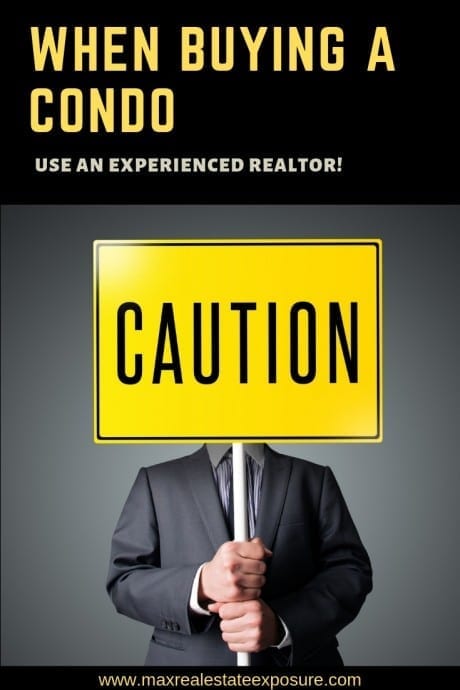Tips For Trouble-Free Condo Buying
 Are you thinking about buying a condo? What is the best advice when buying a condominium?
Are you thinking about buying a condo? What is the best advice when buying a condominium?
Start by immediately understanding that it is much different than purchasing a single-family home!
Buying a condo offers some advantages – living closer to a town, affordability, and less maintenance.
But buying a condo is not the same as purchasing a single-family home.
With single-family homes where there is no HOA, you are the king of the castle. With a condo, you must follow the rules established by the condo board.
Understanding the differences and the particular things you should look out for when purchasing is vital if you want to be happy after the closing.
For this reason, I have put together some of the best tips for buying a condo.
If you are considering a condominium purchase, it is crucial to understand the distinction between condo living and a single-family house.
Without doing so, you could be deeply disappointed in your buying decision.
Let’s examine what you need to know about buying a condo as a first-time buyer. Understanding how to buy a condo will help ensure your success. You can use this as a condo-buying checklist.
What is a Condo?
A “condo” is short for a condominium. Condos are individually owned units within a community of other units.
Condominium owners jointly share common areas within a community, such as hallways, garages, elevators, parking areas, tennis courts, and pools.
Condos can be found as detached units or in high-rise apartment-style buildings. Sometimes you cannot tell the difference between an apartment building vs. individually owned condos.
Individual units in a condo building can be sold, whereas apartments cannot.
Get Clear On How Buying Condos Is Different
Owning a condo is like a cross between owning an apartment and owning a home. With condo-buying, all owners must work together to maintain the buildings and the community.
The benefit of this arrangement are great – you typically have fewer maintenance needs than you would with a separate home, and condos are often cheaper than a comparable size home.
Townhouses are similar to condominiums as well.
What is a Condominium Association?
When buying a condo, it is essential to understand how a condominium association works.
Condominium associations oversee condo developments to safeguard the value and standards associated with their units. They strive to ensure that all components remain intact – providing a stable community environment for each residence.
The condo association is an intermediary between homeowners residing in the community and those overseeing its management.
It enables them to communicate and resolve issues together with ease.
The developer who builds the condos typically lays the groundwork for the condo association. The builder determines the rules and regulations. When the project is completed, they hand over the authority to a board that serves the community.
The owners elect the board to oversee the condo association. You have to count on the condo association members to enforce rules and any issues that arise.
Keep in mind the condo association is the lifeblood of your neighborhood. Without a healthy condo association, you will likely have a miserable experience.
Spend time talking to your Realtor about what you should expect when owning a condo and what you should look out for when buying.
Your real estate agent should help you avoid any nasty surprises.
Questions to Ask Before Buying a Condo
Here is an excellent list of questions to ask before buying a condominium. Your Realtor should be able to help you get these questions answered before you even consider writing an offer.
Some of the biggest regrets from buyers purchasing a condo are not doing their homework in the community they are buying into.
Here are things that are discussed in the above article that you should research:
- How much are the condo fees, and what exactly do they cover?
- Is the neighborhood professionally managed, or do the owners do it?
- Are any special assessments coming up shortly, and how much?
- Are there any pending lawsuits against the complex?
- What is the policy on renting condos in the neighborhood? Having a rental income is vital to some folks.
- How many units are currently owner-occupied, and how many are rented?
- What is the parking policy? Do I own my space? Are there parking lots or designated guest parking?
You Will Pay HOA Fees When Buying a Condo
As a unit owner in condo developments, you must pay HOA fees. Usually, they are a monthly fee, but sometimes they can be paid quarterly in some condominium developments.
Monthly dues can vary bases considerably on what amenities are offered. For example, some condo communities have amenities such as tennis courts, a swimming pool, or fitness centers.
Amenities such as these can drive up monthly payments considerably.
Before making a condo purchase, deciding which kind of perks you don’t mind paying for makes sense. There is no sense in paying monthly maintenance fees on things you will never use.
Some potential buyers purchasing a condo would rather pay for landscaping, lawn mowing, and maintaining common areas.
Buying a condo might be all about avoiding yard work. This is especially true of older buyers moving into a retirement community.
If you are in a cold-weather climate, snow removal might be another essential thing to consider.
Are The Condo Fees Reasonable?
Checking the condo association fees before scheduling a showing is a good idea. Some condo developments have outrageous condo fees due to mismanagement of funds or major repairs that have been recently completed.
There also could be a special assessment whereby potential buyers must pay an additional condo fee for some designated expense.
For example, maybe there are older condo buildings where the roofs need replacement. Homeowners association fees could be temporarily increased to install the new roofs.
When buying condos one of the most crucial tasks for unit owners will be doing due diligence on the HOA condo fees.Click To TweetResearch The Condo Association Before Purchasing a Condominium
One of the best tips for buying a condo is understanding the financial strength of the neighborhood! The condominium association is in charge of keeping things together in your community.
When buying condos, you need to ensure buildings are in good repair, the grounds are maintained, and members uphold their end of the bargain.
Because of this, condo associations tend to have a lot of power. As an owner, it would be best to listen to the association’s rules and regulations. The property covenants are there to ensure everyone’s value.
This does not mean all condo associations are power-hungry or unpleasant, but you should research your particular association before purchasing. Who is in charge? How do they deal with issues?
Do they address problems quickly (some associations are notorious for shirking duties)? Verifying current condominium owners’ feelings about the association is a great way to check up on them.
The condo also could have a property management company handling day-to-day operations. Checking on the property managers will also be a crucial consideration.
A terrible condo association or property management company could harm your property value.
Verify The Condo Reserve Fund When Buying a Condo
 One of the most critical tasks when buying a condo is understanding the community’s financial health.
One of the most critical tasks when buying a condo is understanding the community’s financial health.
Each association has a reserve fund, a pool of money collected from members for repair costs. But each association handles reserves differently, and not all are well-managed.
You want to buy a condo in an association with adequate reserve funds to address any future problems.
It would be best to clarify your share of repair costs should a problem arise.
The best advice when buying a condo is to find out the association’s health and if the current owners are paying their condo fees.
One of the worst things you can find out later is that your neighborhood’s financing is mismanaged. This can decrease the value of your property substantially.
You can also get stuck with a significant special assessment when insufficient funds are in reserve.
Are The Condos FHA Approved?
When buying a condo, you need to determine whether the condo complex you are interested in buying has FHA approval. Doing so is super important.
FHA is a government entity that stands for the Federal Housing Administration for those who don’t know.
The FHA loan is a top-rated mortgage product because it allows a borrower to buy with a 3.5% down payment.
For first-time home buyers and those that don’t have substantial savings, this is huge! FHA loans make up a significant portion of loans made to home buyers.
It is one of the most popular first-time buyer mortgage programs.
When a condo development does not have FHA approval, it affects buyers and sellers. If a condo does not have FHA approval, a buyer can not secure a purchase with this loan product.
Given this, there can be a fairly decent percentage of customers who may not be able to purchase.
This, of course, is not good news for a seller either because when the buyer pool is reduced, so are the values. This is the simple economics of supply vs. demand.
For a complete understanding, see why buyers and sellers should want FHA mortgage approval. This article covers why having FHA financing approvals is vital for buyers and sellers.
Check with your mortgage broker or lender if a condominium complex has FHA approval. Mortgage lenders have a database of condo developments that have approved FHA buildings.
Have an Emergency Fund When Buying a Condominium
Condo ownership is often less expensive than homeownership because members share costs. But remember, this is not like renting an apartment. You will still need money to cover your share of the costs, and there will be many things that you have to pay for on your own.
The association will not help you replace your refrigerator, for instance.
This means you need to have an emergency fund. How much is up to you, but the more money you have in it, the easier you will weather surprises after buying your condo.
How Will You Finance Your Condo Purchase?
If you will use FHA financing, but the condo development does not have FHA approval, you must look at another loan program. There are numerous mortgage programs to choose from.
A conventional loan is the most common form of financing when purchasing a condo.
Of course, just like purchasing a home, you must have a good credit score to buy a condo. A condo loan is no different in that respect.
Fannie Mae and Freddie Mac must also approve condo purchases. There will be a condo questionnaire that associations must answer before financing can be granted.
Your lender should help explain what loan programs work best for your purchase.
Find Out About The Neighbors When Buying a Condo
Everyone has different needs when it comes to a comfortable and happy home. If you are a busy working professional, you may not want to live next door to a condo filled with first-year college students.
If you are a retiree, maybe you would prefer to live next to other older people.
You have preferences, and it’s okay to verify that you are buying a condo where your neighbors fit your lifestyle.
While you may not be thinking of it now, when it comes time to move, you will not be interested in learning how to sell a home with bad neighbors. Does your potential neighbor have a teenager who will be playing loud music or drums late at night?
Do your research and, at the very least, find out who will be abutting you on each side of the condo.
It’s better to be safe than sorry.
Think About Neighborhood Too With Condominium Purchases
 While you may have fallen in love with a particular condo development, it is crucial to consider the surrounding neighborhood in which it is located.
While you may have fallen in love with a particular condo development, it is crucial to consider the surrounding neighborhood in which it is located.
Maybe what attracted you to this condo is the beautiful exterior design, the magnificent kitchen, or how the plan is so well laid out.
Undoubtedly, these things are all great reasons but don’t forget the importance of picking a solid neighborhood.
Many home buyers get caught up in the nuances of the property that they sometimes forget about their surroundings.
The kind of questions you should be thinking about when buying condos include the following:
- How far from the highway is the community?
- What is the crime rate like in the area?
- Is there public transportation nearby?
- Are there significant conveniences nearby, like a great restaurant? A Starbucks coffee shop? A shopping plaza? Maybe good grocery stores are essential to you?
- Is there anything that will annoy you, like highway noise, nearby train tracks, or high-tension wires?
- Is the condo unit close to other things you might be interested in?
- How do the local schools stack up? If you have children or plan on having them, it is essential to understand how schools can affect home values. Over the years, I have seen numerous buyers not understand how much a school system can affect home prices and the ability to realize long-term appreciation. These are all issues that some buyers do not consider because they get so preoccupied with the home they are looking at.
Check on Maintenance When Buying Condos
The general arrangement with condo associations is that they will take care of maintenance for the common areas. But one association’s idea of routine maintenance may not be the same as another.
Some condos may be pristine, while others are a lot rougher.
Discuss how maintenance is handled with the association because you don’t want to spend the next few years (or more) frustrated by the lack of care.
You should find out your responsibility and what falls on the condo association on the same line of thinking. For example, some condo associations take full responsibility for deck or patio maintenance.
Other times this is not the case at all.
Another gray area can include roofs and windows. You will want to know who is responsible for these costly repair items, especially if they are nearing their life expectancy.
Is Buying a Condo a Good Investment?
Condos can be an excellent investment. On the other hand, they may not work out if the association is mismanaged and runs into financial problems.
The bottom line is condos need to be researched just like homes. The area in which you purchase significantly determines whether they will be a good investment.
Generally speaking, larger units are usually a better investment, whether renting or selling.
You may want only enough space to be comfortable in. But when reselling the condo, you will find that two- and three-bedrooms are usually easier to sell.
Studios and one-bedrooms might be all you are initially interested in, but if you want to sell later, you might want to buy something a little bigger.
Please consult your Realtor and ask them about past sales of one-bedroom and studio units in the area. Make sure that these types of condos are not impossible to sell.
From an investment standpoint, look at the appreciation potential between the two. Going with multiple-bedroom condos may be a wiser choice from a resale and investment standpoint if you can comfortably afford it.
The local real estate market will often dictate these decisions, so consult a local real estate agent.
With Condo Buying, You Should Ask About Storage
Storage is a common problem in a condo unit. They are not usually designed for people with lots of things to store. Determine your storage options if you think this will be an issue.
Some condos will offer storage areas or garages as an option.
Try For Condominiums With A View
If at all possible, you want to get a condo that has a decent view. This is important for two reasons. First, living in a place where you can enjoy looking out the window is more enjoyable.
Second, selling a condo with a view is much easier.
A few years ago, I remembered meeting with a woman who wanted to sell her condo in Ashland, Massachusetts. She was not in her unit long, so I asked her why she wanted to leave.
Heessentialwas primarily because of the location of her unit. She had not thought her purchase through well enough about the things that might concern her.
Location Tips When Buying a Condo
- Avoid a unit with an unpleasant view, such as overlooking where the garbage is picked up if it’s not curbside.
- Look for a unit with southern exposure to natural light during the day.
- Avoid a condo that gets oncoming headlights from cars.
- If there is an elevator, you may not want a unit either next to or directly across due to noise.
Make Sure You Hire A Realtor Skilled in Condos
 The internet is a great way to search for ideas on buying a condo and possible listings and general prices.
The internet is a great way to search for ideas on buying a condo and possible listings and general prices.
But there are so many things that need to be clarified – details on condo associations, hidden costs, reserve funds – that having a professional to help you is important.
Unless you want to devote yourself full-time to condo hunting, you cannot gather all the information you need to make an informed decision by working alone.
Realtors will also have better access to new listings and will be able to help you spot deals that you would never recognize by yourself.
Remember, when buying condos, you want to work with an exceptional Realtor, not a taxi cab driver.
The skills of the agent you are working with are vital when buying a condo for all of the above reasons.
Having someone that understands the complexities of a condominium purchase is essential.
One wrong missed detail about a neighborhood could cause years of unhappiness. Avoid this first-time home buyer mistake at all costs.
Just like in every other industry, the skill level of one real estate agent to the next can be very different.
Finding Condos For Sale
The best way to find a condo to buy is to hire an excellent buyer’s agent who will help you find a perfect condominium and be your advocate.
When starting your condominium search, you can also search for condos for sale near me or buying a condo near me.
Get a Home Inspection Before Completing a Condo Purchase
Some people think that it’s not necessary to get a home inspection when buying a condominium. This is not the case. You should still hire a professional home inspector when buying condos.
While issues found on the outside will be the condo association’s responsibility, any problems inside will fall on the individual unit owner to deal with.
It is not uncommon that you would find similar issues at a home inspection as you would with single-family homes.
Buying a Condo vs. a House
Comparing the purchase of a condo vs. a house often relates to the pros and cons. Look at the detailed reference that provides considerations for the advantages and disadvantages of each.
Some people love condos, while others become disappointed with their decision. Whether buying a condo is worth it is a personal decision.
Pros and Cons of Buying a Condo
Let’s look at the advantages and disadvantages of making a condo purchase.
Pros
- Less maintenance: with condos, you have far less to worry about than single-family homes. The exterior will be taken care of by the condo association.
- Lower price: most of the time, the price will be lower for a comparable size condo vs. a home.
- Social opportunities: one of the significant aspects of a condo purchase is the ease of making friends. You will live closer to one another and share perks such as a swimming pool or clubhouse.
- More amenities: in some condo developments, there can be significant perks such as walking trails, a fitness center, tennis courts, swimming pools, clubhouses, etc.
Cons
- Fees: With a condo, you may have fees for things you don’t utilize. Fees also are not fixed and often rise from year to year.
- Rules and Restrictions: you may not like some of the rules that all the unit owners must follow. It is possible a new regulation could be voted in you don’t care for.
- Miss management: there will be other people in charge of overseeing the neighborhood. Things can be mismanaged, including the financial health of the development.
- Less privacy: while there will be more opportunities to meet others, getting the wrong neighbor could be stressful. You could get stuck abutting someone that annoys you terribly.
Final Thoughts on Making a Condo Purchase
A condo can be an affordable alternative to a single-family home. Due diligence, however, is essential when buying condos. Take your time and do all the necessary research to ensure you’ll be happy with your decision.
Hopefully, you have enjoyed the advice on buying a condo. Feel free to reach out if you are in the Metrowest, Massachusett area and would like some assistance. Best of luck!
Additional Helpful Articles When Buying a Condominium
- What are the pros and cons of an HOA – see what you need to know about the advantages and disadvantages of a homeowner association.
- What are the best tips for dealing with an unruly homeowners association – have you got a bad experience with a condo association? Get some guidance on what you can do.
Use these additional resources to glean other tips when buying a condo. The better armed you are with information, the better!
About the author: Bill Gassett, a nationally recognized leader in his field, provided the above Real Estate information on buying a condo. Bill can be reached via email at billgassett@remaxexec.com or by phone at 508-625-0191. Bill has helped people move in and out of Metrowest towns for the last 37+ Years.
Are you thinking of selling your home or condo? I am passionate about Real Estate and love sharing my marketing expertise!
I service Real Estate Sales in the following Metrowest MA towns: Ashland, Bellingham, Douglas, Framingham, Franklin, Grafton, Holliston, Hopkinton, Hopedale, Medway, Mendon, Milford, Millbury, Millville, Natick, Northborough, Northbridge, Shrewsbury, Southborough, Sutton, Wayland, Westborough, Whitinsville, Worcester, Upton, and Uxbridge MA.

